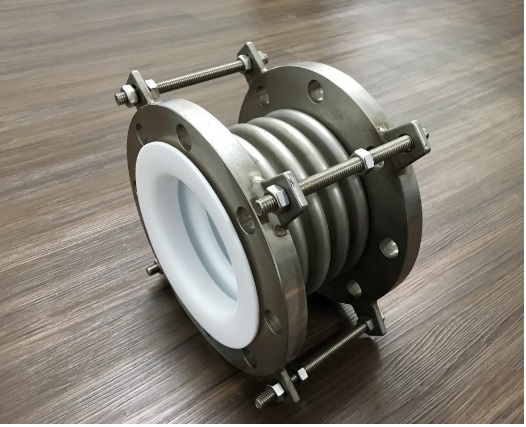
In industrial applications where high temperatures, aggressive chemicals, and intense pressures are at play, the material you choose for expansion joints can make a significant difference in maintenance demands and overall costs.
PTFE expansion joints have become a trusted choice across industries for their long-term performance and ability to withstand extreme conditions with minimal upkeep.
This guide delves into how PTFE expansion joints offer a reliable, low-maintenance solution, and how you can maximize their lifespan for cost savings over time.
Why PTFE Expansion Joints Are Ideal for Challenging Environments
Polytetrafluoroethylene (PTFE) is a synthetic fluoropolymer widely recognized for its durability, resistance to chemicals, and ability to handle high temperatures. PTFE joints excel in corrosive and high-temperature applications, making them particularly suitable for industries such as chemical processing, oil and gas, and power generation.
Key Benefits of PTFE Expansion Joints:
- Corrosion Resistance: PTFE’s chemical structure makes it highly resistant to corrosive substances, preventing the kind of material breakdown that can lead to frequent replacements in harsh environments.
- High Temperature and Pressure Tolerance: PTFE joints perform well in high-temperature and high-pressure applications, ensuring that the system remains intact and operational.
- Low Maintenance Requirements: Unlike metal expansion joints, which require frequent inspections and lubrication, PTFE joints are relatively low-maintenance, offering a longer operational lifespan with minimal upkeep.
By integrating PTFE joints into your system, you not only reduce the risk of wear and tear but also minimize the need for costly repairs, translating to substantial savings in the long run.
How PTFE Joints Reduce Maintenance and Extend System Longevity
Using PTFE expansion joints can significantly cut down on maintenance demands. Their natural resistance to chemical reactions, coupled with durability in extreme environments, means that these joints hold up well over time. Here’s how this translates to operational savings and longevity:
1. Minimized Replacement Frequency
Traditional expansion joints, especially those made from metals, are prone to rust and corrosion, leading to a higher frequency of replacements. PTFE joints, however, resist most corrosive elements, meaning they can maintain integrity for a much longer period.
- Tip: Schedule routine inspections based on your system’s needs, but expect fewer replacements with PTFE. Reduced replacement frequency means lower overall labor and material costs.
2. Lower Inspection and Maintenance Demands
PTFE’s robust properties reduce the need for constant monitoring. This resilience is a clear benefit for industries with long operational cycles, where frequent maintenance halts are impractical.
- Tip: While PTFE joints require less oversight, it’s still essential to incorporate regular checkups into your maintenance schedule to spot any early signs of wear. Fortunately, inspections tend to be less frequent and less costly.
3. Superior Flexibility and Stress Absorption
PTFE expansion joints are designed to absorb thermal expansion and vibration, reducing the impact on other components in the system. This stress absorption helps prevent system fatigue and extends the life of the entire assembly.
- Tip: Ensure proper installation to optimize the joint’s stress absorption capabilities. Consulting with Zepco’s experts on installation and system compatibility can help you achieve maximum performance and lifespan for your PTFE joints.
Maximizing the Cost Efficiency of PTFE Expansion Joints
To truly capitalize on the cost benefits of PTFE expansion joints, a few strategic steps can ensure you’re getting the most value out of this resilient material.
1. Choose the Right Joint for Your Application
PTFE joints are available in various configurations, from simple single-bellows designs to more complex multi-layered structures. Choosing the right design for your application is essential to avoiding premature wear and tear.
- Tip: Consult with Zepco’s team to identify the correct joint configuration based on your industry requirements, temperature, and pressure levels. This can prevent future compatibility issues and maximize your system’s reliability.
2. Install with Precision
Even the best materials need proper installation to deliver peak performance. Misalignment or improper securing of joints can lead to leaks, which negate the benefits of choosing a high-performance material like PTFE.
- Tip: Have Zepco’s trained technicians handle the installation for precise alignment and secure fitting, minimizing the risk of leaks and ensuring the joint performs as expected under high stress.
3. Follow a Predictive Maintenance Schedule
PTFE joints are designed to be low-maintenance, but implementing a predictive maintenance schedule can catch minor issues before they become major problems. Predictive maintenance monitors the system’s operational conditions to gauge when a component might require servicing, minimizing unscheduled downtimes.
- Tip: Leverage any digital monitoring tools that track system temperature and pressure to keep tabs on the joint’s performance. Zepco offers guidance on setting up a maintenance schedule tailored to your system, ensuring long-lasting joint performance.
Zepco’s PTFE Solutions: Designed for Longevity and Performance
When it comes to PTFE expansion joints, Zepco delivers top-quality options that promise durability and efficiency. Our PTFE joints are engineered to withstand even the most challenging conditions, offering an ideal solution for facilities that demand reliability and cost-effectiveness.
At Zepco, we provide:
- Custom Solutions: From unique joint configurations to materials tailored to specific industrial conditions, Zepco ensures that you get the exact PTFE joint that meets your requirements.
- Expert Installation Services: Proper installation is essential for optimal performance, and our technicians are equipped to handle complex setups with precision.
- Ongoing Support: Zepco’s team is here for every step, from initial consultation to installation and maintenance advice. We’re dedicated to helping you maximize the longevity of your expansion joints.
Invest in Long-Term Performance with PTFE Expansion Joints from Zepco
Choosing PTFE expansion joints is a strategic investment in your system’s durability and cost efficiency. Their low-maintenance nature, combined with Zepco’s support, ensures a high-performing, resilient solution that withstands demanding conditions with minimal upkeep.
Ready to boost your system’s longevity?
Let Zepco help you select, install, and maintain PTFE expansion joints that deliver on both performance and savings.
Reach out today to learn more about our customizable PTFE solutions, and take the first step toward a smoother, more cost-effective operation.

